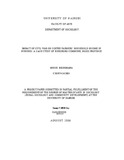| dc.description.abstract | The study investigated the impact of the civil war on the coffee farmer's household income (CFHI) in Ruhororo zone in Burundi. The study focused on the farmer's coffee income at the household level after the war that has led to increased levels of poverty.
Coffee is a leading cash crop in Burundi both at the communal and national economic levels, with 60% oftotal output being exported. However, this precious crop has experienced several bottlenecks due to the civil war that struck Burundi from October 1993 and resulted in a decrease in income among coffee farmers. According to the Bureau of Statistics (1999) in Bujumbura, Ruhororo was reputed to be among the highest coffee producing areas in Burundi and the crop's income is central to livelihood in the area. This study examined whether the civil war could be a major cause of coffee income decrease which many believe is the source of high level of poverty currently observed in Ruhororo commune.
The study was guided by the following research objectives:
I.To examine the extent to which the civil war has affected the coffee farmer's household income.
2. To investigate how the division of labor was affected by the civil war among coffee farmers in Ruhororo.
3. To find out to what extent the civil war has affected the coffee marketing for local farmers during the war in Ruhororo commune.
The study used both quantitative and qualitative research methods. The primary data was obtained from the household heads and from representatives of coffee fanners associations. Standardized questionnaires were used to obtain the data. The key informants provided adequate data pertinent to the study. Direct
observation was also a key research method. A total of 50 heads of households were interviewed and 8 representatives of coffee farmers' associations and one was a coffee washing station manager and another, a Communal Administrator. The data analysis was done using the Statistical Package for Social Sciences
(SPSS).
The study established that 28% of the coffee farmers now earn less than $20 annual income whereas before the war there were no records of income below this figure. Similarly, before the war, 6% of the respondents confirmed that they could earn income beginning at $191 and reaching the highest earning available from coffee. Unfortunately today, they lamented that only 1 % can realize income levels such as these. Regrettably, the study established that 63% of Ruhororo residents could only afford a meal once per day and that 32.7% could only afford new clothes every three years, with 26.5 % affording new clothes once per year.
The study used the Chi-square to test the first hypothesis, which stated that the civil war has negatively affected the coffee farmer's household income in Burundi. The test found an association between the civil war and the decrease in income. The study also found an association between the civil war and coffee income decrease after a greater calculated Chi-square of 42.16 as opposed to
11.07 of the Chi-square table.
The study also established that the war affected the division of labor in Ruhororo villages. This second hypothesis stated that the civil war in Burundi has disrupted the division of labor among the coffee farmers. After testing it by a Chi-square test, it was established that there was a relationship between the civil war and the division of labor because the calculated Chi-square was greater (13.46) against (12.59). Men are now engaged in domestic activities, which was the domain of
women before the war and vice versa. Before the war, only 2% of men could cook but after the war 6% of the respondents confirmed the change. Parallel to that, only 6% of the women could do house construction before the war, but the study has established that 14% are now doing construction as well as other business activities previously done by men alone. This study has showed that the coffee marketing was disrupted in many ways by the civil war although the hypothesis test rejected Ho. About 45.1% of the respondents stated that the pricing for coffee was poor after the war, and 5% found that coffee prices were worse after the war. Among the 50 respondents, only 9.8% were able to sell their coffee to the coffee washing station, and 68% sold their unripe coffee at a throwaway price due to inaccessibility of the markets.
After testing this third hypothesis, stipulating that there was an association between insecurity and the coffee marketing disruption, the test showed a correlation of 0.4 which was not enough to approve Ho although to some degree, there was a disruption of coffee marketing.
In conclusion, the study has shown significant proof that the war was to blame for the high poverty observed among the coffee farmers although it was not totally to blame. The civil war has to some degree had a positive contribution to the residents of Ruhororo by breaking some barriers to gender participation in social activities. In this regard, the study recommends that local coffee farmer's associations be institutionalized, for quick rehabilitation of this highly regarded crop. Indeed, the Burundi Government should increase the cost of coffee per kg, in order to make it more profitable for local farmers. New policies as well aiming at protecting coffee farms in case of any disastrous circumstances should be put in place in Burundi. | en |

